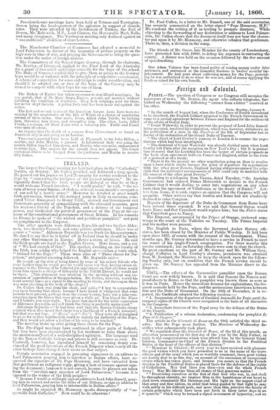IREL AND.
The largest Pro-Papal meeting yet held took place in the "Cathedral," Dublin, on Monday. Dr. Cullen presided and delivered a long speech. He poured out his praises on Lord Normanby for service rendered to the Pope by "unmasking the intrigues of the present ministers." He in- dignantly denied that the Irish people are disloyal or that he or they would welcome French invaders. " I would prefer," he said, "the re- turn of seven years' famine, of cholera, of fever, to one month's occupation of our soil by a hostile army." However he detailed at great length Irish grievances, branded the national party in Italy as assassins, com- pared Victor Emmanuel to Henry VIII., accused our Government and Protestants generally of sympathising with the aforesaid assassins, gave his readers a history of the Popcdom, and a defence of the temporal power, and vindicated the paterral government of the Pope at the ex- pense of the constitutional government of Great Britain. In his remarks on France he spoke of "the wicked and perfidious pamphlet," and paid no compliments to the Emperor.
The other speakers were Alderman Reynolds and two brother Alder- men, two Queen's Counsel, and some private gentlemen. There was of course a "scene." Alderman Reynolds was too frank for his countrymen. He dared to say that he is better off in Ireland than he should be under any other Government in Europe. Hence a storm of hisses. He said the Irish people are loyal to the English Crown. More hisses, and a cry of "We had enough of that." The speaker, dwelling on the loyalty of the Irish, was asking who helped the English at--when a voice cried, " Ireland for the Pope !" There were cries of " Three cheers for Na- poleon," and partial cheering followed. Mr. Reynolds said— He would—at the risk of being hissed by some of his ardent friends who went further than he would go—he would again soy that, having sworn al- legiance to the Throne, if he believed his appearance on that platform would leave him open to a charge of disloyalty to the British Throne, he would not be there. [This statement was received by the meeting without any ex- pression of approbation or disapprobation. Dr. Cullen, however, waved his hand several times as a signal to the meeting to cheer, and thereupon there was some cheering in the body of the chapel.) Dr. Cullen then rose from the chair, and said—" I beg to congratulate you upon hearing that cheer, because I have heard it whispered that some persons here present, perhaps from the enemy's camp, have put a false con- struction upon the hisses that were given a while go. You hissed the Times and I believe you were right. You gave that cheer for the noble expression of Alderman Reynolds, and sal think the thing is perfectly understood." Alderman Reynolds—" It had been said that the Roman Catholic clergy rejoiced when they heard that there was a likelihood of a French invasion ; but that was not true. ("Hear," and " .217o.") They were all determined to en as far as they legitimately could to sustain the authority of the Pope, and they would not allow a feather of his wing to be touched."
The meeting broke up after giving three cheers for the Pope.
The Pro-Papal meetings have continued in other parts of Ireland; but they have been characterized by few incidents to raise them above the monotonouslevel of a well-disciplined agitation. The language used by the Roman Catholic bishops and priests is still as coarse as ever. Dr. Cantwell, however, has signalized himself by remaining firmly con- vinced of the good intentions of the French Emperor when nearly all the other bishops have changed their views on that subject.
Certain secretaries engaged in procuring signatures to an address to Lord Palmerston praying him to interfere in Italian affairs, have re- quested the signature of Mr. Pope Hennessy, and have extracted from that gentleman an indignant reply, giving a host of reasons against sign- ing the document ; because it is not correct, because its phrases are taken from the " revolutn nary speeches of Lord Palmerston," because it is opposed to the wishes
would asowf l sign people—
"Because an address to Lord John Russell, pray-
ing him to correct and revise the titles of our Bishops, as sign an address to Lord Palmerston, praying him to intermeddle in Italian affairs."
As might be expected Mr. Hennessy speaks disrespectfully of "re- spectable Irish Catholics." How could he do otherwise ? Dr. Paul Cullen, in a letter to Mr. Russell, one of the said secretaries, has severely commented on the letter signed "Pope Hennessy, M.P." He condense the writing of it as tending to promote disunion. While objecting to the forwarding of any declaration or address to Lord Palmer- ston, Dr. Cullen shows that the document itself does not bear the charac- ter put upon it by Mr. Hennessy, and otherwise rebukes that gentleman. There is, then, a division in the camp.
The friends of Mr. Greer, late Member for the county of Londonderry, have presented him with 1000/. to defray his expenses in contesting the county. A dinner was held on the occasion followed by the due amount of speechmaking.
One Adam Valance has been found guilty of raising money under false pretences, and sentenced at the Limerick Sessions to twelve months' im- prisonment. He had gone about collecting money for the Pope, pretend- ing he was authorized to do so when he was not, and of course applying the fruids so raised for his own benefit.


























 Previous page
Previous page